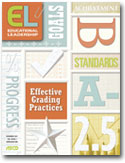Even after many years, I know that I can get a rise out of my sister with the mention of one phrase: run-on sentences. Her memory of getting an F because she, a National Merit semifinalist, had omitted one punctuation mark in an otherwise outstanding essay can make her furious.
She's not the only one to have experienced a grading practice that, intended to deliver one lesson, actually produced quite a different effect—namely, a long-lasting dismay about the arbitrariness of grades.
Amy, for example, remembers receiving a note sent home that said that her daughter could earn a higher grade if she bought her a $70 costume to wear at an assembly. She didn't buy it, and her daughter did fine.
John recalls that as a 5th grader, his grade was discouraging enough to make him stop working hard, only to find later that the teacher had mistakenly recorded a B- when she meant to write a B+. He didn't exactly waste the next semester, but he could have learned much more, he notes.
And Katie recalls that her haiku was awarded a C because it wasn't about Japan. (The teacher hadn't mentioned that it had to be about Japan.) After she built a case that her poem about the sun was really alluding to the Land of the Rising Sun, her teacher relented and gave her an A. The lesson she learned: Questioning the grade was a good way to get it raised, whether the reasoning was appropriate or not.
When I myself was a teacher, I remember defending some of my own strongly held grading practices—arguing, for instance, that students needed to compete for a limited number of As. Only the very best papers deserved the best grade, I thought at the time. I also was once so angry about what I saw as cheating that I made two students who turned in virtually the same paper split one grade. Their sincere belief was that they had learned more while working together than they would have alone.
This issue about effective grading practices delves into the relationship between learning and grades. As Susan M. Brookhart (p. 10) writes, educators tend to assume that others agree with their positions on grading, but, in fact, educators hold a range of opinions. Some believe in grading on effort and punctuality and on using grades to foster both a work ethic and academic learning. Others believe that grades should reflect only where students are in relation to mastering specific content or skills.
Parents and family members have multiple views on grading as well, with many viewing grades as indicators of their child's status in the class. Students, on the other hand, often regard grades as the ultimate mystery. When asked what grade they think they will get, "I don't know" is a frequently given answer.
That's why, as a number of our authors note, before a school attempts to make changes to report cards, it must consider the purposes that the grades will serve. Are the grades meant to be incentives, feedback, or an evaluation? What elements will be graded? Can the same reporting tool have many purposes, or is it better to do what many schools do and provide separate marks for progress (improvement from the last performance); process (effort and timeliness); and product (achievement of standards)?
Once you study the research about grading—and this issue of EL is certainly a good start—the work of communicating the purpose and method of your system begins. It is wise to state the purpose of your grading system on the report card itself, and to communicate often and well with families, our authors note.
As we move forward in developing standards-based grading systems, we might be erring on the side of too much information, Thomas Guskey (p. 16) warns. For example although most educators know what "phonemic understanding" implies, not as many parents do. "To see grading and reporting more as a challenge in effective communication than as one of simply documenting or quantifying achievement seems to be a major requirement in reform efforts today."
There is no doubt that our society believes in grades. We look for four-star movies, five-star restaurants, top-10 colleges, and even Grade A eggs. Although we tend to think of these ratings as objective, we know that it's important to read the full reviews—and look for cracks in the shells. This issue explores both the promising practices and the cracks in our grading systems.
Most of us agree that if grades are going to be meaningful, they must be as accurate and fair as possible. The question before us is, How do we make that happen?
<P ID="scherer-audio"><!-- Start of Brightcove Player --><!--div style="display:none"></div--><!--By use of this code snippet, I agree to the Brightcove Publisher T and C found at https://accounts.brightcove.com/en/terms-and-conditions/. --><!--object id="myExperience1224629155001" class="BrightcoveExperience"> <param name="bgcolor" value="#FFFFFF" /><param name="width" value="570" /><param name="height" value="380" /><param name="playerID" value="18377529001" /> <param name="playerKey" value="AQ~~,AAAAAmGjiRE~,escbD3Me8-wT_coVb7sTe18vG6vv3Oyk" /> <param name="isVid" value="true" /><param name="dynamicStreaming" value="true" /> <param name="@videoPlayer" value="1224629155001" /> </object--><!-- This script tag will cause the Brightcove Players defined above it to be created as soonas the line is read by the browser. If you wish to have the player instantiated only afterthe rest of the HTML is processed and the page load is complete, remove the line.--><!-- End of Brightcove Player -->

